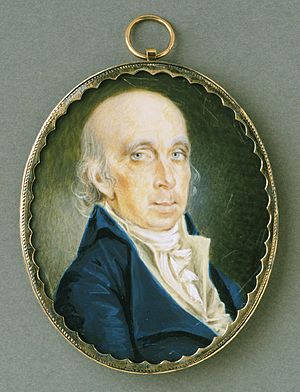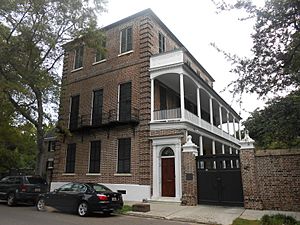Thomas Heyward Jr. facts for kids
Quick facts for kids
Thomas Heyward Jr.
|
|
|---|---|
 |
|
| Born | July 28, 1746 |
| Died | March 6, 1809 (aged 62) Old House, South Carolina, United States
|
| Resting place | Heyward Family Cemetery, Old House |
| Known for | signer of the United States Declaration of Independence |
| Signature | |
Thomas Heyward Jr. (born July 28, 1746 – died March 6, 1809) was an important person in the early history of the United States. He was one of the Founding Fathers. He signed both the United States Declaration of Independence and the Articles of Confederation. He was a representative for South Carolina in the Continental Congress. He made big sacrifices during the American Revolution.
Contents
Early Life and Education
Thomas Heyward Jr. was born in St. Luke's Parish. This area is now known as Jasper County, South Carolina. His parents were Mary (Miles) and Daniel Heyward.
He learned at home when he was young. Later, he traveled to England to study law. He became a member of a famous law group called the Honourable Society of the Middle Temple.
A Patriot in the Revolution
In 1775, Thomas Heyward Jr. was chosen to join the Continental Congress. The next year, he was the last person to sign the Declaration of Independence. This document declared America's freedom from Great Britain.
Heyward went back to South Carolina in 1778. He became a judge there. He was in charge of a group of soldiers during the war. British soldiers captured him during the siege of Charleston.
On August 27, 1780, British troops took him from his home in Charleston. They held him in the Old Exchange Building. He lost a lot of his property during this time. This was a huge financial sacrifice for him. Because of this, people later called him a "martyr" of the revolution.
Hours after his arrest, he and 28 other leaders were moved to a ship. On September 4, they were sent to St. Augustine, Florida. They stayed there for about 11 months. They were finally set free in a prisoner exchange. While he was in prison, Heyward changed a popular English song. He turned "God Save the King" into "God Save the States."
Life After the War
In 1784, he became a member of the American Philosophical Society. This was a group for important thinkers. He kept working as a judge after the war ended. He stopped being a judge in 1798.
He is buried at Old House Plantation. This place is near Ridgeland, South Carolina. The house was added to the National Register of Historic Places in 1997.
In 1970, a school was opened in Ridgeland, South Carolina. It was named Thomas Heyward Academy.
Family Life
Thomas Heyward Jr. was married two times. Both of his wives were named Elizabeth. He married his first wife when he was 26. She was the daughter of Colonel John and Sarah Gibbes Mathews. She was also the sister of South Carolina governor John Mathews.
His first wife passed away in 1782. This happened in Philadelphia. She is buried in St. Peter's Episcopal Church yard. They had six children together. Only one son, Daniel, lived past childhood.
His second wife was the daughter of Colonel Thomas and Mary Elliott Savage. They had three children who grew up: Thomas, William, and Elizabeth. One of his notable descendants was DuBose Heyward. DuBose Heyward wrote a novel called Porgy. This story was later turned into a play. Then, George Gershwin made it into a famous American opera called Porgy and Bess.
See also
 | Tommie Smith |
 | Simone Manuel |
 | Shani Davis |
 | Simone Biles |
 | Alice Coachman |


